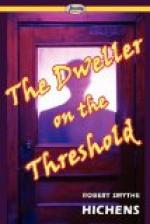“Telepathy!” said Chichester, shaking Malling by the hand. “I believe I looked round because I knew I should see you. Yet I supposed you to be still in Ceylon.” He glanced at the rector rather doubtfully, seemed to take a resolution, and with an air almost of doggedness added, “May I?” and introduced the two men to one another.
Mr. Harding observed the new-comer with an interest that was unmistakable.
“You are the Mr. Malling of whom Professor Stepton has spoken to me,” he said,—“who has done so much experimental work for him?”
“Yes.”
“The professor comes to my church now and then.”
“I have heard him say so.”
“You saw we were looking at the river? Before I came to London I was at Liverpool, and learned there to love great rivers. There is something in a great river that reminds us—”
He caught his curate’s eye and was silent.
“Are you walking my way?” asked Malling. “I am going by the Abbey and Victoria Street to Cadogan Square.”
“Then we will accompany you as far as Victoria Station,” said the rector.
“You don’t think it would be wiser to take a hansom?” began Chichester. “You remember—”
“No, no, certainly not. Walking always does me good,” rejoined Mr. Harding, almost in a tone of rebuke.
The curate said nothing more, and the three men set out toward Parliament Square, Malling walking between the two clergymen.
He felt embarrassed, and this surprised him, for he was an extremely self-reliant man and entirely free from shyness. At first he thought that possibly his odd discomfort arose from the fact that he was in company with two men who, perhaps, had quite recently had a difference which they were endeavoring out of courtesy to conceal from him. Perhaps there had been a slight quarrel over some parish matter. Certainly when he first spoke with them there had been something uneasy, a suspicion of strain, in the manner of both. But then he remembered how, before Chichester had turned round, they had been leaning amicably above the river.
No, it could not be that. He sought mentally for some other reason. But while he did so he talked, and endeavored to rid himself promptly of the unwelcome feeling that beset him.
In this effort, however, he did not at first succeed. The “conditions” were evidently unsatisfactory. He wondered whether if he were not walking between the two men he would feel more comfortable, and presently, at a crossing, he managed to change his place. He was now next to Mr. Harding, who had the curate on his other side, and at once he felt more at his ease. The rector of St. Joseph’s led the conversation, in which Malling joined, and at first the curate was silent. But presently Malling noticed a thing that struck him as odd. Chichester began to “chip in” now and then, and whenever he did so it was either to modify what Mr. Harding




